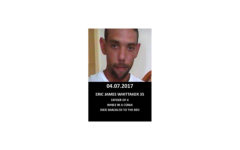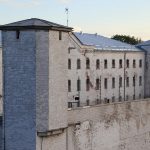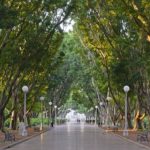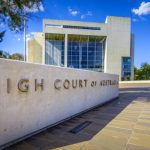Suspicious Circumstances: Eric Whittaker Shackled, While on Life Support

Eric Whittaker died in hospital, after being shackled to a bed for several days. This followed his suffering a ruptured brain aneurysm, which a prison guard ignored repeated distress calls about. The 35-year-old Gamilaraay man – who was on remand at the time of his death – left five children behind.
Why Mr Whittaker’s ankles were chained and restrained as he lay upon the bed – unconscious and on breathing support – towards his final hours remains a mystery. And it’s now left to the NSW coroner to assess the circumstances.
During the coronial hearings two weeks ago, the court heard that despite a brain scan having been performed on Mr Whittaker, it took another six hours before a neurologist attended his case, which is time not available when a brain haemorrhage has occurred.
This is only one of a number of suspicious circumstances surrounding Whittaker’s death, which took place at Westmead Hospital on 4 July 2017. As well, there were conflicting accounts, an apathetic response, along with questions surrounding his vital organs.
And it’s the allegedly prejudiced treatment that Whittaker suffered at the hands of NSW authorities that the Blak Deaths in Custody (BDIC) campaign is highlighting, in an effort to bring about substantial reforms, so that the First Peoples of this land no longer die in colonial detention.
On deaf ears
The inquest heard that Mr Whittaker made twenty distress calls to a prison officer on duty between 4.52 am and 7.51 am on 2 July, which was when he was suffering the aneurysm in his cell. Eric was highly disoriented and unaware of his correct circumstances as he made the emergency calls.
“He was asking in the confusion that he had from the pressure. He started to ask, ‘Please open the door,” explained Raul Bassi, secretary of the Indigenous Social Justice Association (ISJA) Sydney. “He asked for the guard to open the door. The guard said he had to wait.”
Mr Whittaker was making the calls from an intercom in his cell at the privately managed Parklea Correctional Centre in Sydney’s northwest. And the inquest heard testimony from Corrective Services NSW officer James Dobry, who was taking the calls.
Dobry told the court that Whittaker had already been seen by the night rover, prior to his distress calls. And he admitted that at the time, the inmate’s behaviour “was serious enough to demand a second welfare check”. However, this never happened.
From the beginning of the distress calls, Dobry had decided that Eric could wait for assistance until other officers checked his cell in a number of hours’ time. And Dobry denied another guard’s claim that he told them not to worry about Whittaker as he was just a “spinner”.
Ulterior motives
When asked why authorities had kept Mr Whittaker shackled to a hospital bed at a time when he was unconscious, and surviving via breathing apparatus, Mr Bassi asserted that “he was connected to the respirator to keep his organs alive for when the family came in to ask for them”.
As Bassi tells it, when the Whittaker family arrived at the hospital, they were confronted with an unconscious Eric chained to a bed. And despite it being a culturally sensitive matter, those in charge began asking whether the family was willing to donate Mr Whittaker’s organs.
“When the family finally arrived, they asked for the organs,” Bassi told Sydney Criminal Lawyers. “They told them they knew they didn’t agree with it, because they’re Aboriginal people.” And he added that the Whittaker family was outraged.
The long-time activist added that as often happens in these cases, initial accounts conflicted. And all of them proved to be false. Corrective services claimed he’d fallen in the prison yard, while NSW police said he fell in an office, and there was also a third account that related to falling in his cell.
A series of related deaths
According to Mr Bassi, the circumstances around Mr Whittaker’s death has similarities to both the 2016 death of Rebecca Maher in a police lockup and that of David Dungay Junior in 2017, which took place in the hospital ward of Long Bay gaol.
Just as Whittaker cried out repeatedly to no avail, so too did Dungay cry out that he couldn’t breathe as he was being held face down on a bed by officers. The guards asserted that he could breathe if he could speak. They then had a nurse inject him with a powerful sedative, and he stopped breathing.
In the case of Ms Maher, officers at Maitland police station failed to follow correct police procedures. Despite her incoherent state, officers neglected to properly search or check on her, whilst she was in her cell, just as officer Dobry left Whittaker – in need of help – alone in his cell.
“It’s the same with all deaths in custody. They don’t care: for racist reasons, for inhumane reasons, for white supremacist reasons,” Bassi made clear. And he went on to state that a child of a prominent politician would hardly be treated in the same way.
Significant system change
The ISJA and FIRE-led BDIC campaign presented a declaration to NSW parliament in May, outlining measures that could prevent First Nations deaths in custody, which now amount to over 400 since the time the Royal Commission tabled its recommendations in 1991.
Mr Bassi explained that the declaration called for a halt to the disproportionate remanding of Aboriginal and Torres Strait Islander people, as well as a shift in the different approaches authorities take to First Nations people, compared with the way they treat non-Indigenous people in custody.
“The most important thing is stopping incarceration because this system cannot guarantee the safety of Aboriginal people in gaol. It can’t be trusted,” Bassi concluded.
“The other thing that we asked was that when they’re policing people, we want everybody to be treated in the same way. We want equal law.”







